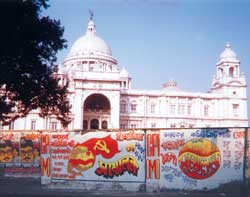 We can choose our friends, but we can't choose our neighbours. Nepal and India are stuck with each other, so we might as well learn to get along.
We can choose our friends, but we can't choose our neighbours. Nepal and India are stuck with each other, so we might as well learn to get along. This week, the Chanakyapuri roundabout in New Delhi is festooned with Nepali double-triangles flapping alongside the Indian tricolour. Prime Minister Sher Bahadur Deuba's visit to India offers another opportunity to mend fences, show statesmanship and take bilateral ties to a new level of accommodation and understanding.
But the question on everyone's mind is: why Calcutta? The West Bengal capital is neither a cybercity nor a Sai Baba centre. New Delhi appears to be hesitant about the central government taking the lead in any future mediation on the Maoist problem, and is passing the buck to the Marxists in West Bengal.
After all, Calcutta has been the training and ideological base for Nepali Maoists. West Bengal also has experience in dealing with and crushing the Naxalites, and the comrades in Writers' Building may have a few pointers for Deuba. It was Siliguri where Maoist leaders gave audiences to a procession of Nepali leftists during the ceasefire in October, so it is not inconceivable that a secret face-to-face meeting is on the cards over the weekend.
Deuba's India visit comes at a time of unparalleled crisis in Nepal. There is an emerging consensus among Nepal's political parties, academics and even sections of the public that if India is not a part of the solution to the Maoist problem, then it is a part of the problem. And if the two neighbours aren't careful, Nepal's problem may soon become India's too.
The precedent for Indian involvement in Nepal's domestic politics was set way back with the overthrow of the Rana regime and King Tribhuvan's triumphant return to Nepal from Delhi in 1950. When King Mahendra dissolved parliament and banned political parties ten years later, the Nepali Congress launched its armed insurrection from Indian soil. It is not surprising therefore that Nepal's Maoists have used the open border and India's vast "strategic depth" for training, arming and logistics.
Nepal's leadership now realises that it may not be able to guarantee the survival of parliamentary democracy without some degree of Indian help, and Deuba may be hoping to convince his interlocutors in New Delhi and Calcutta about this.
here are episodes from recent history that spooks Nepal's leaders. In Punjab, in Sri Lanka and vis-?-vis the Bhutanese refugees, India has shown a propensity to build up friction, get sparks flying, and then let the fires rage. In Sri Lanka the fire got so fierce, it had to beat a hasty retreat.
Today, India has joined the United States' "war on terror", and it cannot give the impression of ignoring this new brand of red terror in its own backyard in the Himalaya. So, Sher Bahadur Deuba will be trying to convince the Indian leadership that curbing Maoist activities on Indian soil is in its own long-term interest. He will also try to assuage the antsy Indians about the western military hardware the Royal Nepal Army urgently requires for its counter-insurgency operations.
The Indian response to this may be a cool "yes", but New Delhi will draw the line at more intensive foreign military involvement in training and supplying the Royal Nepal Army. At the same time, India may use the opportunity to push forward its own mediation role, or even propose unilateral political or military action to end the insurgency.
The Maoists are in the mood to use their new-found stature, gained from having bloodied the army in Mangalsen, to wrest political concessions. Deuba was deeply insulted by the Maoists' betrayal in November, but is under pressure to smoke the peace pipe again. The military campaign is also racing against time: it needs to register dramatic victories before the monsoon sets in.
If the Indians do put forward a mediation proposal, Deuba will have to think hard about the repercussions back home. Greater Indian involvement in resolving the crisis either through mediation or military means will increase Indian influence in Kathmandu. Which may be what New Delhi has always wanted, but there will be a backlash within Nepal and fuel further public mistrust of Indian intentions.
How genuinely helpful India is in response to Deuba's request for help will determine the future of not only bilateral relations, but also the course of the Maoist insurgency. The open border between Nepal and India doesn't just facilitate free movement of people and trade. It may also make it easier for the sparks of Nepal's Maoist war to spill over into the tinder-dry farms of Bihar, Jharkhand and Andhra Pradesh.
(Hari Roka is an independent leftist analyst and a research fellow at the Jawaharlal Nehru University in New Delhi.)


